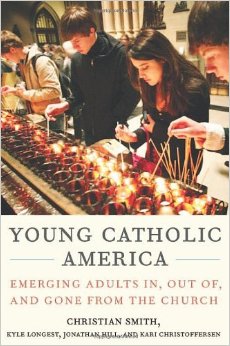This is part of the periodic series You Should Read This on books worth reading.
Catholic moral theologians often ask how are people formed in their faith? How do they come to be better disciples? Sociologist Christian Smith asks similar questions from a sociological perspective in his Young Catholic America: Emerging Adults In, Out of, and Gone from the Church. He examines what affects the faith of emerging adults (18-25). Here are five insights from this book valuable to moral theologians and anyone interested in handing on the faith.
1. Faith is Declining among Emerging Adults. The faith of emerging adults is declining, according to Smith. (Although a recent review at the National Catholic Reporter challenges this reading of the data.) The decline is most obvious in lower rates of mass attendance in this age group, but it is apparent in other ways. Smith argues that emerging adults “do not use their Catholic faith as a key resource for arriving at any counter culture religious, social, or ethical commitments.” Instead, they seem to mirror the attitudes and beliefs of their surrounding culture. They are not so much angry with the church but rather view it as less important than other social commitments. For Smith though, this decline is not something unique to this generation. For the past four decades, Catholics have had a gradual decline in their beliefs and practices. Emerging adults are just the latest manifestation of a longer trend.
2. Being Catholic is more social than chosen. If young adults are not going to mass and do not prioritize their faith, are they Catholic? As Smith explores the data, he finds that young adults will often self-identity as Catholic if they had Catholic parents who raised them Catholic. This was true both for those who did and did not go to mass and those who do and do not agree with Church teachings. It seems that emerging adults understand their Catholicism as connected to their family and would not reject it just as they would not reject their family. Catholicism, for many emerging adults then, is primarily a part of their social network and only, perhaps, secondarily a chosen faith.
3. Parents are key to handing on the faith. Given this social dimension, it should not be a surprise that Smith insists that parents are one of the most important factors in affecting the faith of emerging adults. He writes, “the single most important measurable factor determining the religious and spiritual lives of teenagers and young adults is the religious faith, commitments, and practices of their parents.” The best condition is having both parents committed to raising their children in the faith. However, since mothers are usually committed to doing so, fathers’ commitment or lack of commitment is often the deciding factor. Smith writes,
Committed Catholic fathers are not a sufficient condition for producing children who will be committed Catholics down the road. However, in most cases, having a committed Catholic father seems to be a necessary condition. Having a doubting and uncommitted Catholic father appears in many cases to be a sufficient condition for a Catholic child to be an uncommitted and even an alienated Catholic as an adult.
4. Catholic schools and parishes appear to have little effect. Smith spends some time on parishes and Catholic primary and secondary schools. On the surface, emerging adults who went to church and attended Catholic schools knew more about the faith and were more likely to practice it. Yet, these differences seem to be more associated with the parents’ faith than the parish or school itself. In other words, it is the parents and their religious commitment behind their children going to church, attending Catholic schools, and continuing to believe. The most significant factor for these institutions that Smith found was that Catholic schools prevented young adults from totally abandoning their faith.
5. Emerging adults need more than religious parents. If schools and parishes are less significant than parental commitment, is it all up to the parents? Supportive parents are one of the three most important factors affecting the faith of emerging adults, but Smith insists there are two more. Emerging adults must also regularly engage in religious behaviors and practices, and emerging adults must internalize the beliefs and make them their own. While parents are practically necessary, they are not sufficient on their own. Emerging adults need to choose the faith and practice it themselves.
Smith has more insights and more depth to the ones I have offered here in his Young Catholic America. I highlighted these five as they seem important for those thinking about and working on how to teach the faith to others. These ideas mostly help to understand emerging adults, but they also indicate that relationships, particularly parental ones, are essential for the faith to be handed on to others.




Trackbacks/Pingbacks